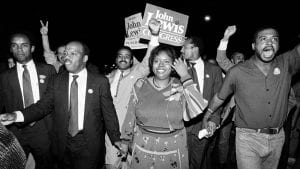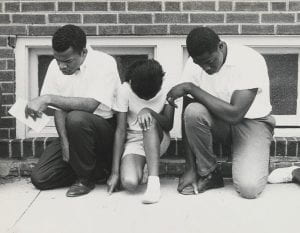
When John Lewis was diagnosed with fourth stage pancreatic cancer back in December, I was shaken. My unsettled spirit at this news was, in part, caused from a flood of memories around the same news my family had received about my father years earlier. Another cause of my unrest came in recognizing that another good man was entering into the battle of his life knowing full well that this battle could not be won. And, I was distraught because our country needed John Lewis, the “conscience of Congress.” News of Representative Lewis’ illness deeply affected me just as the news of his death now haunts me.
And so, I find myself pondering a great man whose life and legacy are gifts to our world that simply cannot be forgotten. John Lewis is known as a hero, a Civil Rights champion, an activist, a man of God, a recipient of the Medal of Freedom. These titles (and so many others) and the tireless work that inspires such titles help paint the picture of a talented and dedicated man who spent six decades in service to humanity. But, there is another title that Mr. Lewis most likely never knew but one that most certainly suits him well. John Lewis was a Vincentian.
The work of Vincentian leaders is always grounded in something far beyond themselves. For Vincent, his work was a matter of answering a call from Divine Providence. As St. Vincent entered into that call and followed, he was able to find the strength and confidence to tackle the daunting ministry before him.[1] This same confidence and strength that John Lewis found in his work came from his deep and abiding faith. In a 2004 interview about his work in the Civil Rights Movement, Mr. Lewis spoke boldly of the importance faith played as the Movement unfolded: The [Civil Rights] movement was built on deep-seated religious convictions, and the movement grew out of a sense of faith — faith in God and faith in one’s fellow human beings… Without our faith, without the spirit and spiritual bearings and underpinning, we would not have been so successful. Without prayer, without faith in the Almighty, the civil rights movement would have been like a bird without wings.”[2] It was a deep seated faith that carried John Lewis through dozens and dozens of physical beatings and even more political struggles. It was an unfaltering faith in God’s goodness that surely gave Mr. Lewis the courage and will to continue speaking out and working for justice up until his dying days.
“God allows us to give rise to the practice of two beautiful virtues: perseverance, which leads us to attain the goal, and constancy, which helps us to overcome difficulties.”[3] — St. Vincent de Paul

Like John Lewis, St. Louise de Marillac encountered and overcame many challenges while always practicing and encouraging great kindness and goodness: “Our vocation of servants of the poor calls us to practice the gentleness, humility and forbearance that we owe to others. We must respect and honor everyone.”[4] Louise de Marillac and John Lewis humbly reached out to people of all walks of life, listening to their stories and opinions, and acting in ways that honored them. In Mr. Lewis’ case, he even asked blessings upon those who brutally beat him. His commitment to honoring the dignity of others can be seen in a statement he made following President Obama’s decision to endorse same-sex marriage: “Once people begin to see the similarities between themselves and others, instead of focusing on differences, they come to recognize that equality is essentially a matter of human rights and human dignity.” Representative Lewis began his work as a young man fighting for rights of the Black community but his lifetime work was dedicated to fighting for the rights of all people. He did so in all humility and kindness, loving his neighbors, and never giving up in his fight for justice.
“The question which is agitating the world today is a social one. It is a struggle between those who have nothing and those who have too much. It is a violent clash of opulence and poverty which is shaking the ground under our feet. Our duty…is to throw ourselves between these two camps in order to accomplish by love, what justice alone cannot do.”[5] — Frederic Ozanam
DePaul University describes its distinguishing marks as, “Motivated by the example of Saint Vincent, who instilled a love of God by leading his contemporaries in serving urgent human needs, … characterized by ennobling the God-given dignity of each person…. manifested by… a sensitivity to and care for the needs of each other and of those served, with a special concern for the deprived members of society.”[6] These distinguised marks of our DePaul community could easily be a summation of the life and legacy of John Lewis. He was a man of God who dedicated his life to serving urgent human needs, ennobling the dignity of all, and with a deep concern for the marginalized and deprived members of our society. John Lewis truly was a man who exemplified the hallmarks of our Vincentian community. Claiming John Lewis as a Vincentian in spirit, word, and deed seems very fitting, indeed.
As with all our Vincentian models in life, we are left with a gift and a call from Representative Lewis who was never satisfied with simply accepting the status quo. His life and now his legacy become a call to each of us to continue the hard work in which he engaged and encouraged in us. As Vincentians we do not sit on our laurels but we continue to push forward, always recognizing that there is much to be done in our woeful world. The spirits of St. Vincent, St. Louise, Elizabeth Seaton, Frederic Ozanam, and John Lewis inspire us today to continue the important work of seeking justice and pouring love into the world. We honor John Lewis and all our Vincentian ancestors when we follow the example and heed the words of Representative Lewis:
“So you have a moral obligation, a mission and a mandate, to speak up, speak out and get in good trouble… You can do it. You must do it. Not just for yourselves but for generations yet unborn.”[7]—John Lewis
As we honor a great man who fought many battles through life, we know what must be done: let’s go make some good trouble!
Rev. Dr. Diane R. S. Dardón, ELCA
Religious Diversity & Pastoral Care, Director
[1]“Providence must call us and we must follow it, if we are to go forward confidently.”Vincent de Paul (Volume: 3 | Page#: 538) To Rene Almeras, Superior, In Rome, 4 February, 1650.
[2]Lewis, John. “John Lewis Extended Interview.” Interview by Kim Lawton. Religious and Ethics News Weekly, 16, January 2004, https://www.pbs.org/wnet/religionandethics/2004/01/16/january-16-2004-john-lewis-extended-interview/2897/.
[3]Vincent de Paul (Volume: 4 | Page#: 36-37) To Guillaume Comaire, June 15, 1650.
[4]Louise de Marillac (Volume: Page#: 468).
[5]Quote attributed to Frederic Ozanam. The Vincentian Formation Network, accessed June 20, 2020, http://vincentians.com/en/quotes-collection/frederic-ozanam-quotes/.
[6]“DePaul University’s Mission.” Division of Mission and Ministry, accessed June 20, 2020,
https://offices.depaul.edu/mission-ministry/about/Pages/mission.aspx.
[7]Lewis, John. “Graduation Address.” 14, June 2015, Lawrence University, Appleton, Wisconsin. Speech.